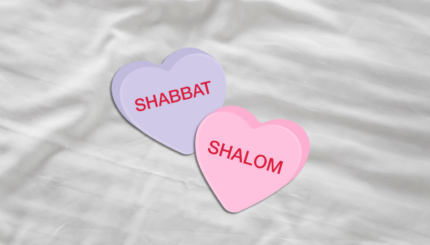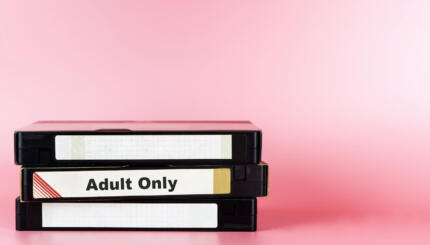[A digital rendering of this originally hand-written epistolary blog post can be found here.]
June 19, 2015
Hello and Happy Pride Month!
I write to you by hand because, like my fellow millennials, I love new things that feel like old things. We build “upcycled” shelves out of reclaimed driftwood. We use smartphone apps to make our cell phone photos look like Polaroids. Record players are back in vogue. A scribbled letter is my favorite way to soften cold digital words into something cozy and human. I’m a queer-identified, frum-identified Jew in a complicated relationship with Orthodoxy, and I want to tell you about my community.
I moved to Washington Heights, in Manhattan, in September because a kallah, a bride, gave me a blessing and told me to. At the time I had already decided to move to New York, but was leaning toward Brooklyn. At a dinner hosted by some Yiddishists in the Heights to honor Yudis and her new wife, Yocheved, Yudis was floating on a post-wedding spiritual high. I asked her for a blessing.
Me: Yudis, would you give me a bracha?
Yudis: Absolutely. I have the perfect one.[We scurry off to a quiet room.]
Yudis: I want to bless you with the strength to give yourself the things you need to be happy and healthy. If you want a world where you can be queer and also frum, there is no question that it’s Washington Heights. You won’t need to sacrifice either one.
Because guess what? Washington Heights is not only home to Yeshiva University, nucleus of the capital “M” Modern Orthodox world. Over the past five years the neighborhood has become a hub for a relatively large community of halakhically observant lesbian, gay, bisexual, trans*, and queer Jews. In a world where most Orthodox LGBTQ Jews are isolated and fear they might be alone in their painful identity balance, this special intergenerational group of Jews has flourished.
My sense is that we exist largely because of Eshel, a new group which has helped so many of us find each other, connect, and discover how powerful and awesome we are. Dedicated to creating community and acceptance for LGBTQ Jews and their families within Orthodox spaces, Eshel is at the helm of steering big change. In just five years, Eshel has hosted local and national gatherings, building a network of over 1,000 queer Jews, allies, and families. Eshel offers much needed support to Orthodox parents with LGBTQ children, and sponsors “Merchav Batuach,” a new “safe space” seminar for Orthodox college students. For me and my parents, Eshel has been a life raft.
We exist, and people are starting to notice.
Several months ago a Modern Orthodox rabbi invited LGBTQ Jews in his community to sit down for a private conversation. Eleven of us squeezed into a tiny room and the rabbi, admitting his nervousness, listened carefully as we took turns sharing our experiences of fear and alienation within the Orthodox world.
One of the most powerful stories came from a friend, “Moshe,” who revealed his true self to the rabbi. As he spoke, I sensed his fear that publicly revealing he was gay might mean losing his place as a trusted member of the community. Moshe shared the pain of watching passively as community members celebrated life cycle events. With each engagement, wedding, and then bris and bar mitzvah, his peers progressed within the community while he remained single and static. As queer Jews in the mainstream Orthodox world move toward building Jewish families, they know that their life cycle events will not be celebrated with a kiddush. Instead, an engagement, bris, or bar mitzvah is a risk of communal estrangement.
Even without a place for me within institutional Orthodoxy, I have been blessed with a safe space in Washington Heights among frum queer peers and straight allies. At Yudis and Yocheved’s wedding, yeshiva day school alumni and Orthodox rabbinical students danced alongside gay Yiddish speakers and their ex-Chasidish friends. When the couple announced their engagement, over a hundred people smushed into an apartment in the Heights (!) to sing and dance and drink l’chaims.
To live as an Orthodox Jew and cope with the challenges of halakhic minutiae requires both a nurturing community and trusted leadership. Miraculously, I have found a Jewish community where I feel like I fit. But as I struggle with an ever-growing pile of questions I can’t ask, my relationship with Orthodoxy becomes increasingly fragile. I seem to be off “The” Derech, (path) and am struggling to pave my own.
If you are a maharat (Orthodox female spiritual leader), a rabbi, a synagogue president, a teacher, or just a friend who wants to extend support to me and my neighbors within your Orthodox communities, you’ll need to start by knowing the barriers and questions that keep us on the fringes.
Here are a few of my own:
- If I brought a girlfriend to synagogue, and we sat on the same side of the mechitza, should we sit far away from each other?
- Can a gay-identified kohen have an aliyah or perform Birkat Kohanim, the priestly blessing?
- Are there any spiritual or halakhic teachings that speak to the relationship between a non-biological parent and their child?
- If I bring a friend to synagogue who does not fit neatly into a gender category, where should they sit?
- In a same-sex relationship where shmirat negiah, the prohibition on touching, is not technically obligatory, are there any practices reflecting the spirit of the mitzvah that might be worth adopting?
- How can we create traditionally rooted ceremonies to mark a commitment to one’s partner where no such framework exists?
You don’t need to have the answers yet. We certainly don’t.
In the joyous spirit of this month, I proudly (ha ha) invite you to celebrate with me and my community af simkhes, on happy occasions, or even just for Shabbat lunch. See you in the Heights!
Be well,
Leana
For more on LGBT issues in the Jewish community, go to the Keshet blog.
bar mitzvah
Pronounced: bar MITZ-vuh, also bar meetz-VAH, Origin: Hebrew, Jewish rite of passage for a 13-year-old boy.
mitzvah
Pronounced: MITZ-vuh or meetz-VAH, Origin: Hebrew, commandment, also used to mean good deed.
Moshe
Pronounced: moe-SHEH, Origin: Hebrew, Moses, whom God chooses to lead the Jews out of Egypt.
Shabbat
Pronounced: shuh-BAHT or shah-BAHT, Origin: Hebrew, the Sabbath, from sundown Friday to sundown Saturday.
yeshiva
Pronounced: yuh-SHEE-vuh or yeh-shee-VAH, Origin: Hebrew, a traditional religious school, where students mainly study Jewish texts.



